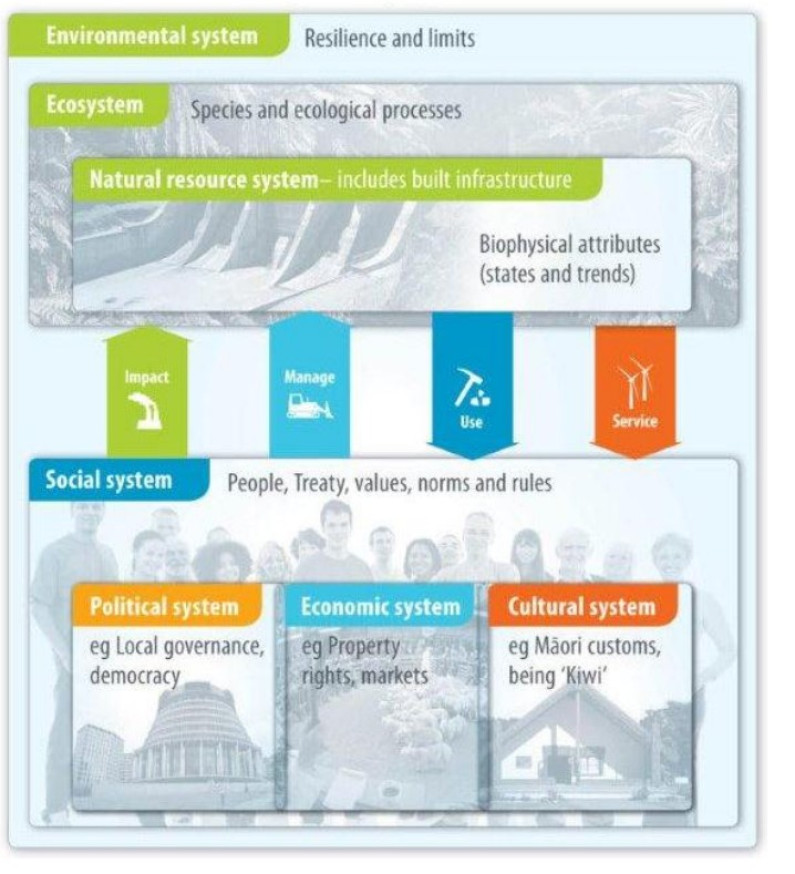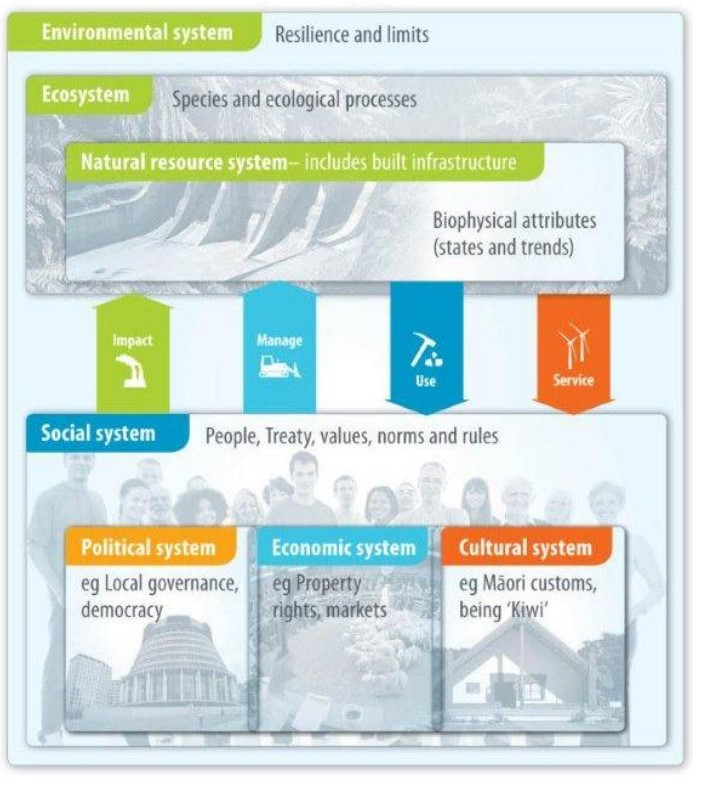Economic growth and environmental management
The Government continues to focus on ensuring balanced and sustainable economic growth to improve the well-being of New Zealanders. Much of New Zealand’s international competitive advantage lies in the quality and quantity of its natural resources. High environmental standards are essential for market access and New Zealand’s economic growth. However, there is increasing recognition that New Zealand’s natural resources are coming under pressure from competing uses and, in some critical areas, are approaching biophysical and usage limits. There is also recognition that our regulatory regimes are not fit for purpose. While in the past there has been a focus on making marginal improvements to the policy framework, in the medium term this has shifted towards foundation reform in areas such as freshwater and resource management.
Management of our natural resources has been, and will continue to be, a complex and contentious cross-sector, multi-generational issue. Sustainable use of New Zealand’s environment requires stable and enduring policy focused on long-term outcomes. Successful environmental management enables the use of the environment to maximise and maintain benefits, today and in the future.
The environmental management system
New Zealand’s environmental management system is best understood by thinking about the underlying social system which drives our relationship with natural resources and the ecological system on which New Zealanders depend.
The complex social system determines the way New Zealanders use and manage our natural resources. While New Zealand’s ecological systems exists regardless of people, they provide us with life-supporting service and resources which underpin our economy and way of life.

This figure shows the interrelationships within the environmental management system – between people and natural resources.
The Environmental System is the outermost system within which other systems are contained (ie, ecosystem, natural resource system, and social system). The interrelationships between these sub-systems impact on the resilience and biophysical limits of the overall environmental system.
The ecosystem relates to species and ecological processes – they exist independently of people but provide life-supporting services and resources that underpin our economy and way of life.
The natural resource system is a subset of the ecosystem and includes built infrastructure. Changes to the system’s biophysical attributes impact on the ecosystem as well as the social system.
The social system drives our relationship with natural resources. The political and economic system, as well as people’s values (eg, Māori customs and being ‘kiwi’) influence how we interact with natural resources.

This figure shows the interrelationships within the environmental management system – between people and natural resources.
The Environmental System is the outermost system within which other systems are contained (ie, ecosystem, natural resource system, and social system). The interrelationships between these sub-systems impact on the resilience and biophysical limits of the overall environmental system.
The ecosystem relates to species and ecological processes – they exist independently of people but provide life-supporting services and resources that underpin our economy and way of life.
The natural resource system is a subset of the ecosystem and includes built infrastructure. Changes to the system’s biophysical attributes impact on the ecosystem as well as the social system.
The social system drives our relationship with natural resources. The political and economic system, as well as people’s values (eg, Māori customs and being ‘kiwi’) influence how we interact with natural resources.
Our ecological systems are constantly changing, as are the demands we place on them. The environmental management system must be able to adapt to changing circumstances so it must be supported by knowledge of what is happening in the environment, including an understanding of behaviour and performance that affects outcomes. Access to robust and trusted information on the system’s performance is critical for good decision-making and for evaluating the impact of policies and decisions on natural resources over time.
As well as being adaptive, the environmental management system needs to be proactive, strategic and forward-looking to plan for future opportunities and pressures. As the issues surrounding our natural resources and how we use them are often complex and contentious, we must recognise that some uncertainty is inevitable and that we can never have all the ‘facts’. We should not let this paralyse decision-making though – risks must be considered in a transparent manner, but a precautionary approach taken where outcomes may be undesirable or irreversible.
The environmental management system must be able to deliver stable and enduring policy settings focused on long-term outcomes. The policy settings must be supported by society, recognise Māori rights and interests and the Treaty, and deliver outcomes that are widely supported. This is only possible when all those involved in environmental management understand and are responsive to one another. An example of this in action is the Land and Water Forum which comprises representatives from primary industries, environmental organisations, iwi, and active observers from regional councils and central government – all with different and sometimes conflicting values in relation to freshwater. By working together, understanding and responding to each other’s different perspectives, the Forum have been able to build a strong constituency for change and a consensus on a way forward for reform. The challenge for the Ministry is to replicate this success across our other policy areas.
Interaction with the wider environmental management system
Since the reforms of central and local government in the late 1980s, New Zealand has had a heavily decentralised environmental management system. The emphasis has been on managing society’s effects on the ecological system with as little national regulation as necessary, while ensuring the sustainable management of natural resources. During this period we have helped establish the high-level framework for managing society’s interaction with ecological systems. While guidance, tools and monitoring has been provided, implementation of policies has largely been left to communities to interpret, apply and measure.
In response to growing unease within the community about this highly devolved, light-handed approach, we are now positioning ourself at the centre of the wider environmental management system with a strong partnership approach to all parts. We will not focus on just our own role, but also the success of all those involved in environmental management and all outcomes that are important to New Zealanders. This represents a fundamental shift in the way we work.
Our partnerships span central government agencies and Crown entities such as the Environmental Protection Authority, iwi/Māori, regional and territorial government, business, NGOs and the wider community. They are all critical parts of environmental management in New Zealand and the Ministry seeks to work closely with them. See appendix 1 for more information on the connections we have with other central government agencies and local government as we carry out our work programme.
The Ministry for the Environment has a vital cross-cutting role to play in leading the Natural Resources Sector, whose purpose is to manage the interaction between the economy and the environment, which is central to New Zealand’s social, cultural, economic and environmental wellbeing. We collaborate with other agencies in the Natural Resources Sector to give the Government consistent advice about policy for, and management of, natural resources.
The Natural Resources Sector is collaborating to lead one of the six Business Growth Agenda (BGA) work streams (Building Natural Resources). The Sector brings together and articulates a common direction for New Zealand’s natural resources policy as well as collectively agreeing priorities. The BGA provides opportunity to engage collectively with the informal Natural Resources Ministers’ group which is having a positive impact on the quality of policy advice being provided. For more information on the NRS and its role within the environmental management system, see the Natural Resources Sector section below.
The Ministry also works closely and collaboratively with the Environmental Protection Authority (EPA) to improve and monitor environmental management on behalf of the Minister for the Environment. Central government provides direction and guidance for their activities through national policy statements and national environmental standards (which are binding on local authorities), and also through professional development and sharing knowledge about best practice.
Significant policy changes in resource and freshwater management will move from regulation into implementation in the coming years. To ensure the successful implementation of these reforms, we will work closely with the wider environmental management system, providing stronger leadership in system design and implementation, while monitoring the system’s performance to identify and make any necessary improvements.
The Natural Resources Sector
One of the ways we maintain effective cross-agency relationships is through the leadership role we take with the Natural Resources Sector (NRS). The Sector was established in 2008 to provide more integrated and consistent high-quality policy advice on natural resources, and connect the economy with the environment.
The NRS is headed by the Chief Executives of seven agencies (chaired by the Ministry for the Environment’s Chief Executive), who act as a leadership team for natural resources policy work in central government. They are:
- Ministry for the Environment
- Ministry of Business, Innovation and Employment
- Ministry for Primary Industries
- Land Information New Zealand
- Department of Conservation
- Te Puni Kōkiri
- Department of Internal Affairs.
They are supported by the three central agencies: the Treasury, the Department of Prime Minister and Cabinet, and the State Services Commission. Since the NRS was established five years ago, it has made strong progress.
The role of the Ministry for the Environment
The NRS places a premium on co-creation of policy advice and the development of shared policy frameworks, while also ensuring that leadership of specific work programmes is shared among NRS agencies. However, the Ministry for the Environment convenes the overall work and direction of the NRS and as such requires an ongoing investment in policy leadership capability.
The Ministry houses the jointly funded Support Unit that drives oversight of the NRS work programme and the NRS network on behalf of the Sector. We also provide ongoing strategic oversight and guidance to the Sector through the appointment of the Deputy Secretary Sector Strategy whose role involves taking a sector view on priority issues and championing collective endeavour and common approaches. The combination of our dedicated support for the NRS and our more general policy capacity are being aligned to ensure we can provide effective strategic leadership to the NRS.
Increasing obligations
An increasing proportion of the Ministry’s work programme is driven by initiatives led from other portfolio areas. In particular, the Treaty of Waitangi settlement process and free trade agreements both result in obligations for the Ministry. This means we must be involved in negotiations to ensure the obligations are realistic, as well as in implementation.
Environmental accords and relationship agreements are often aspects of Treaty settlements. We currently have obligations that create an ongoing relationship with 27 settled groups and these relationship agreements are increasing in both number and scope.
We also lead the negotiation and implementation of environmental agreements under the 2001 Framework for Integrating Environment Objectives in Trade Agreements. New Zealand is a party to seven trade agreements with eight associated environmental cooperation agreements, and is currently negotiating six further trade agreements which include environmental chapters or have associated environmental agreements.
Our operating context
May 2014
© Ministry for the Environment